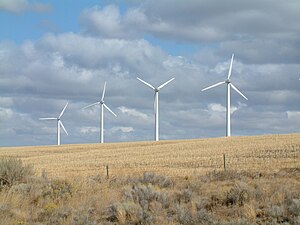Seems wind turbines are proliferating in that part of the country at a rapid (some would say a
Image via Wikipedia
And the energy company, out of New York, has sent a representative round the area with some cash, to entice residents to keep their complaints to a minimum — meaning none. After enough people had registered the same behavior, the company did, in fact, confirm that the energy company representative had paid several people $5,000 each in return for a promise not to make a loud noise about the wind turbines. Other people had refused the money, preferring to retain their right to complain. Technically, the people who have taken the money still have a right to complain. They have merely entered into a verbal contract with the energy company to do otherwise.
But the more pressing juxtaposition is this: In an age when electricity needs are far and furiously outstripping the nation's capacity to adequately fill those needs, these people are protesting a natural solution that would solve a lot of problems. The wind is so fierce in that part of the country that residents have often had to shout to make themselves heard anyway, and that was before the windmills went up; so it's not as if these people are having to deal with a whole lot more noise than normal, since the turbines don't really turn nearly as much when the wind isn't blowing. (Some people have requested that the machines be turned off at night, which is fair enough, as far as it goes. Theoretically, the demand for electricity is lower in the middle of the night, anyway — except for all of those television programs being recorded using digital hard drive technology.)
The main point here, though, is that it won't be too many more generations until those wind turbines will be an absolute necessity, as fossil fuels run out or become so hideously expensive as to create the same result. It is entirely possible that an energy crisis is looming in the next few decades.
Energy generation always has a cost and a by-product. We don't tend to see or experience what occurred in the production of oil, gas, and other "traditional" forms of energy because we just buy it and consume it. In fact, most of us probably give no more than a passing flight of thought to how actually electricity is actually made, transmitted, and transferred.

Wind turbines do make noise, but that's nothing compared to the noise that electricity consumers would make if their power went out — for a long period of time.

No comments:
Post a Comment